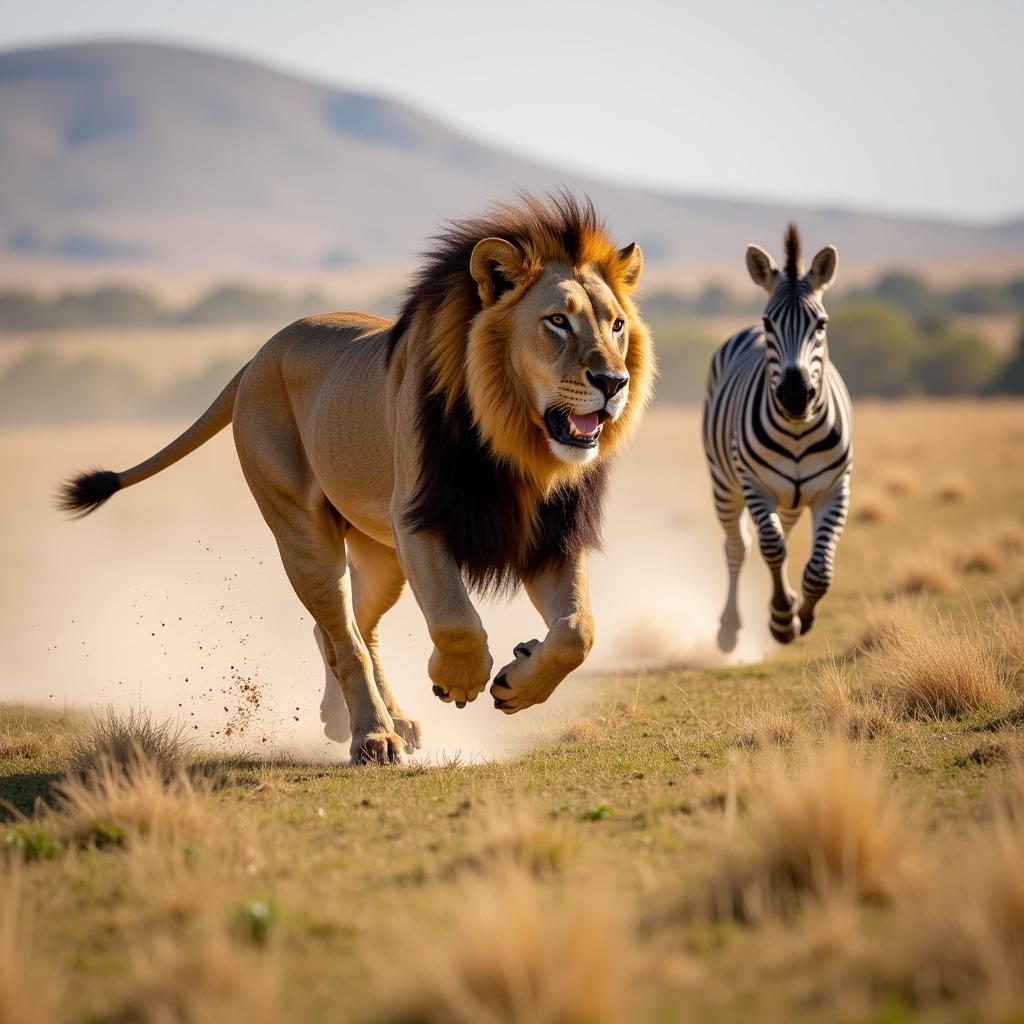The African Lion: King of the Savanna
The African Lion, a symbol of strength and majesty, reigns supreme in the African savanna. These iconic big cats, with their distinctive manes and powerful roars, are a vital part of the ecosystem and a source of endless fascination for wildlife enthusiasts worldwide.
Understanding the African Lion: More Than Just a Pretty Mane
African lions (Panthera leo leo) are the second largest cat species globally, after tigers. Their size and weight vary depending on the region and sex. Males, easily identified by their impressive manes, can grow up to 8.2 feet long and weigh over 550 pounds, while females are slightly smaller, reaching about 6 feet in length and weighing around 400 pounds.
The lion’s mane, a unique characteristic among big cats, serves multiple purposes. It acts as protection during fights, a visual signal of dominance, and even a way to attract potential mates. The darker and fuller the mane, the healthier and more dominant the male is perceived to be.
Social Structure: Life in a Pride
African lions are highly social animals, living in groups called prides. A typical pride consists of several related females, their cubs, and one or two adult males. The females usually do the majority of the hunting, bringing down prey as large as zebras and wildebeest, while the males protect the territory and the pride from rivals.
The bonds within a pride are strong, and cooperation is key to their survival. The lionesses share the responsibility of raising cubs, nursing and protecting each other’s offspring. This collaborative approach ensures the survival of the next generation.
Habitat and Distribution: Where the Lions Roam
Historically, African lions roamed across a vast area, from northern Africa to the southern tip of the continent. However, their range has dramatically shrunk over the past century due to habitat loss, human-wildlife conflict, and other threats.
 African lion chasing a zebra across the savanna
African lion chasing a zebra across the savanna
Today, African lions are primarily found in sub-Saharan Africa, with the largest populations concentrated in East African countries like Tanzania and Kenya. They prefer habitats like grasslands, savannas, and open woodlands, where prey is abundant.
The Future of the King: Challenges and Conservation
The African lion faces an uncertain future. Their populations are declining at an alarming rate, and they are listed as “Vulnerable” on the International Union for Conservation of Nature (IUCN) Red List.
Habitat loss, driven by human population growth and agricultural expansion, is a major threat. Lions are also vulnerable to poaching, often killed for their body parts or in retaliation for livestock depredation.
Fortunately, there are dedicated individuals and organizations working tirelessly to protect the African lion. Conservation efforts focus on habitat preservation, anti-poaching patrols, community education, and research.
The African Lion’s Place in Our World
The African lion holds a special place in human cultures worldwide. They are often depicted as symbols of courage, strength, and royalty, appearing in ancient mythology, modern literature, and popular culture.
However, beyond their symbolic significance, African lions play a crucial role in maintaining the delicate balance of their ecosystems. As apex predators, they help to regulate prey populations, preventing overgrazing and ensuring the health of the entire food chain.
Their presence is a testament to the incredible biodiversity of our planet and a reminder of the importance of conservation efforts to protect these magnificent creatures for generations to come.
African Lion FAQs
What is the lifespan of an African lion in the wild?
In the wild, African lions typically live for 10-14 years.
Do all African lions live in prides?
While most African lions live in prides, some males, particularly young ones, may live solitary lives or form small coalitions with other males.
What is the biggest threat to African lions?
Habitat loss and human-wildlife conflict are the biggest threats to African lions today.
Learn More About African Wildlife
For those interested in delving deeper into the fascinating world of African lions and other incredible creatures, be sure to explore these related articles:
- Discover the differences between Barbary lion vs African lion size.
- Compare the majestic Asian lion vs African lion.
- Plan an unforgettable African lion safari.
- Explore the powerful names given to African lion names male.
- Understand the power struggle between a Bengal tiger vs African lion.
Need Help Planning Your African Safari?
Contact us today for expert guidance and personalized itineraries to witness the awe-inspiring African lion in its natural habitat.
Contact Information:
Phone: +255768904061
Email: kaka.mag@gmail.com
Address: Mbarali DC Mawindi, Kangaga, Tanzania
Our dedicated team is available 24/7 to assist you.


